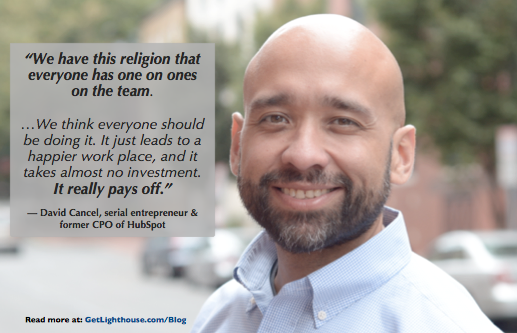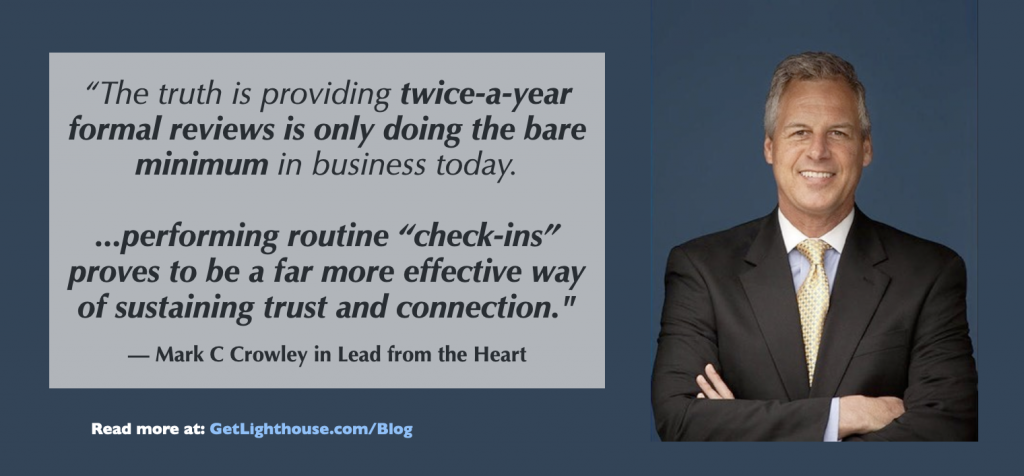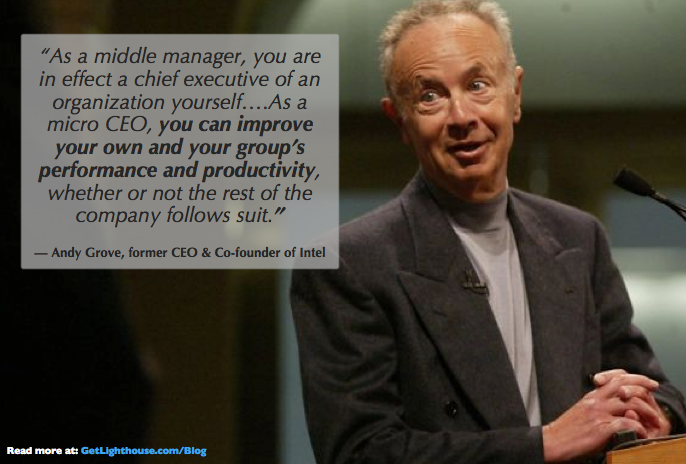While many leaders like Andy Grove of Intel, Ben Horowitz of A16Z, and Yelp CEO Jeremy Stoppelman swear by one on one meetings, there are many managers and leaders that doubt their importance and choose not to have them.
A big part of this doubt is often due to experiencing the disadvantages of one to one meetings themselves. Like any good idea, it takes work to make them successful, and many new managers believe some bad one on one meetings myths.
As I've spoken with thousands of leaders and managers as we developed Lighthouse, I've heard a series of misconceptions, or myths, contributing to people failing to have good one on one meetings. They think they're simply natural disadvantages of one to one meetings, but they're really misuse of the time and misunderstanding of the purpose of these meetings.
To help you (or a friend) reconsider the value of one on one meetings, here's 10 myths that we've heard and the reality of each of these busted myths. They'll help you
Table of Contents: Myths & Disadvantages of One to One Meetings
- Myth #1: One on one meetings are a waste of time
- Myth #2: Experienced team members don't need one on one meetings.
- Myth #3: An Open Door Policy has the same effect as one on one meetings.
- Myth #4: Checking in at review time is plenty.
- Myth #5: You should talk about the same thing in every one on one meeting.
- Myth #6: You should not take notes in one on one meetings.
- Myth #7: All you need to do is show up to a one on one meeting and listen.
- Myth #8: It's okay to cancel one on one meetings, my team even says so.
- Myth #9: If one on one meetings failed before, you can't try again.
- Myth #10: Good one on one meetings are easy from the first one.

10 One on One Meetings Myths Preventing You from Having Great Relationships with Your Team
Take a good look at each of these one on one meetings myths. It's possible you believe only one of them, or a combination of a few. Our goal today is to help you understand each myth, as well as better approaches that avoid these problems.
Myth #1: One on one meetings are a waste of time.
There are a lot of excuses reasons why one on one meetings can seem like a waste:
- You don't feel like you have anything to talk about.
- Team members don't bring anything to discuss often enough.
- You believe your team is mature enough to not need them.
- You don't think you have time for them.
The list can go on, but these reasons for feeling like they're a waste are usually because you're not making the most of them (more on that later). As the legendary leader Andy Grove put it best on one on one meetings:
"Ninety minutes of your time can enhance the quality of your subordinate's work for two weeks, or for some eighty-plus hours, and also upgrade your understanding of what he's doing."
Reality: If you do one on one meetings well, both you and your team members will look forward to them and it will have a strong, positive impact on your team.

Myth #2: Experienced team members don't need one on one meetings.
While younger, less experienced members of your team may need more attention and coaching, it's a mistake to think that your more experienced people don't need any. One on one meetings are a crucial part of communication in your company and play a key role in giving every one of your team members a voice and the help they need.
One on one meetings are more than just a time to hear complaints or deal with interpersonal issues on your team. They're also an opportunity to talk about growth, feedback, and ideas, all in a safe, private setting.
Why deny that from the veterans on your team?
As Ben Horowitz, startup CEO, investor, and author of The Hard Thing About Hard Things writes:
"Absent a well-designed communication architecture, information and ideas will stagnate and your company will degenerate into a bad place to work ... one-on-ones provide an excellent mechanism for information and ideas to flow up the organization."
Reality: No matter a person's age, they still have goals, feedback, and ideas that are best discussed in one on one meetings.
Myth #3: An Open Door Policy has the same effect as one on one meetings.
Your team can come to you with any problem, right? Your door is always open.
Or, maybe you don't even have a door; they can just walk right up to your desk in the middle of the office.
But, there's a few problems with relying on this:
- It's intimidating: To come and interrupt their boss, there's a aura of grave importance needed to interrupt you.
- You may not always be there: What if they have a problem and you're busy, in a meeting, or otherwise not there?
- They don't know when it's open: How do they know if they can't see your office from their desk or they're a remote worker? Just because you're at your desk, is it a good time?
Even legendary leader, Ed Catmull, who leads and co-founded Pixar, fell in this trap during the making of Toy Story as he wrote in his leadership book, Creativity, Inc:
"My door had always been open! I'd assumed that that would guarantee me a place in the loop, at least when it came to major sources of tension like this. Not a single production manager had dropped by to express frustration or make a suggestion in the five years we worked on Toy Story."
Ed was shocked that a key problem for the production managers was never brought up to him even though he thought he was creating an environment to hear them. What he learned instead was:
"Being on the lookout for problems was not the same as seeing problems."
Reality: An open door policy is helpful, but does not provide the same opportunity for regular, structured discussions about what's important to them like a one on one meeting does. If they know there's a low pressure meeting every week or two to talk about issues, they're much more likely to bring them to you.

Myth #4: Checking in at review time is plenty.
If annual or bi-annual reviews are sufficient, then that's all you need for the kinds of discussions you have in one on one meetings, right? Not really. Even once a month is not enough.
There's so much you can talk about that you're leaving a lot of value and opportunity to learn and fix problems on the table by not having them regularly (i.e.- weekly or bi-weekly). You're also letting issues grow too big before you're even aware of them, let alone fixing them.
As Andy Grove wrote in High Output Management:
"A common rule we should always try to heed is to detect and fix any problem at the lowest-value stage possible."
How can you hope to fix problems when they're small if you only talk about them a few times a year?
When a problem goes unchecked, it leads to irreparable damages like team members quitting, firings being necessary, and morale plummeting.
Reality: Have your one on one meetings weekly or biweekly to ensure no problem grows too big before discussing, and to give feedback shortly after the situation or problem occurs.
Myth #5: You should talk about the same thing in every one on one meeting.
A lot of managers I've spoken with ask the same questions in each of their one on one meetings. They're usually along the lines of:
- How's it going?
- How's [project] going?
- What do you want to talk about?
Those are a great start (although you should avoid status updates), but that's leaving a lot of unspoken subjects you should cover like:
- Short term goals
- Their long term goals
- Ideas to improve the company
- Ideas for their self-improvement
- How you can improve
- Their happiness, both work and personal
- Team relations and morale
- Their work habits
- ... for specific questions see this list of one on one meeting questions
As you can see, there's a lot of ways to talk about things important to your team.
Reality: Mix up the questions you ask to ensure there's no elephants in the room and you take full advantage of the candor and relationship building of one on one meetings.

Myth #6: You should not take notes in one on one meetings.
One on one meetings can be a casual, more laid-back meeting. Some managers have them over lunches, taking walks, or even over beers. However, that casual nature should not downplay the importance of what's discussed.
When a team member brings up an issue in a one on one meeting, it's clearly important to them. You need to do something about it and help them feel like you're working together to make incremental progress on the issue. The best thing you can do is start by writing it down.
As Andy Grove wrote in his seminal leadership book, High Output Management:
"Equally important is what "writing it down” symbolizes ... the act implies a commitment, like a handshake, that something will be done. The supervisor, also having taken notes, can then follow up at the next one-on-one.”
If you don't write anything down, you're unlikely to remember what was discussed next time, nor take any action on what was discussed.
Both of those are cardinal sins for one on one meetings as your team member will lose confidence in you doing anything about what they bring up. If that happens, they'll stop bringing issues to you and morale will plummet. You're also likely to start believing this is one of the disadvantages of one to one meetings.
Reality: Writing down what they tell you is crucial to ensuring you do something about what they bring up and remember what was discussed in your last meeting with them. If they bring it up in a one on one meeting, it's important to them and they will usually want you to remember it.
Myth #7: All you need to do is show up to a one on one meeting and listen.
Now, you know from Myth #6 you need to take notes, and you can see from Myth #5, there's a lot of questions you can ask. Doing both of those things will help a lot to improve the quality of your one on one meetings, but listening actively is then still not enough.
Great one on one meetings challenge your team members. They may bring good things to discuss, and as a manager you need to take it a step further. From Andy Grove's Principle of Didactic Management: "Ask one more question!
"When the supervisor thinks the subordinate has said all he wants ... he should ask another question. He should try to keep the flow of thoughts coming by prompting the subordinate with queries until both feel satisfied they have gotten to the bottom of the problem."
If you're going to have a good discussion with them, don't leave information on the table by failing to fully explore the topic with them.
You should also end each one on one meeting with a simple question to ensure something happens based on your discussion:
- What can each of us do to make progress on what we talked about today?
Reality: Be an active listener, and also challenge your team members to help you really understand their problem and work together on potential solutions. End your meeting by setting action items so your discussion leads to progress together on what you hear.

Myth #8: It's okay to cancel one on one meetings, my team even says so.
When you have one on one meetings regularly, you build confidence in your team that they have a consistent time they can talk to you about ideas, feedback, and problems. When you break that rhythm by canceling their one on one meetings, you disrupt their ability to have regular, open communication with you.
If you ask to cancel, they'll usually say it's okay, because you have a power imbalance over them; they want to please you and help you out. If you're asking to cancel, they'll assume it's for something more important than them, but they will then resent you since now something else matters more than the one on one meeting that's for them (i.e.- they don't matter to you).
As you can see from earlier myths, there are plenty of things to talk about in one on one meetings, so don't miss out on those discussions by canceling.
Your team will be less motivated to bring things to their one on one meeting if they're not sure it's going to happen. They will also then question how you value their input if you cancel because something is often more pressing.
One of the biggest disadvantages of one to one meetings come from canceling! As serial entrepreneur Michael Wolfe writes:
A company lives or dies by:
- Getting the best people to join the company
- Keeping them engaged and productive
- Making great decisions about what these people should work on
A manager has only a few tools in her arsenal to do these, and 1-1's are perhaps the most powerful.
Reality: Never cancel one on one meetings. If you can't meet at your scheduled time, reschedule. Only holidays and vacations should lead to canceled one on one meetings.
Myth #9: If one on one meetings failed before, you can't try again.
If no one ever told you how to have great one on one meetings and your past managers didn't set a great example, there's a pretty good chance your team didn't like your one on one meetings. Because of that, you may have tried and eventually just given up on them.
That's a shame.
While there may be some scars or resentment from past, ineffective one on one meetings, don't let that stop you from getting it right the second time. Tell them why you want to try them again, and what will be different this time.
Even if your team is skeptical, a few great one on one meetings will change anyone's mind.
The old Chinese proverb about trees also applies to your one on one meetings:
"The best time to plant a tree was 20 years ago. The second best time is now.”
Reality: If you set your team's expectations and learn from what made them fail before, you can always try again. The resulting payoff will make your effort totally worth it for you and your team.
Myth #10: Good one on one meetings are easy from the first one.
The first time you have a one on one meeting with a team member is going to be awkward. Often, like a first date level awkward. This is one of the real disadvantages of one to one meetings.
But don't let that stop you.
Even if tough situations it can make a huge difference.
A story: Earlier in my career, I was managing a remote team member who prided himself in efficiency. For one thing, he hated meetings, so he was really skeptical about the value of one on one meetings. Compounding things, I didn't know him very well since he was remote.
I picked out some good one on one meeting questions for us to discuss each week, and while the first was a pretty awkward chat, by the third one on one, it was something we both looked forward to. It wasn't long before I was getting all kinds of interesting insights from him and his productivity and morale was boosted. We also were working better together than ever before.
Reality: The first time you ask even some of the best questions in a one on one meeting can be awkward. Push through it and you'll find each one gets better as you follow up and follow through on what you discuss. Soon enough, you'll then both be looking forward to them and seeing the major ROI of one on ones.

Are you letting these one on one meeting myths ruin the time you spend with your team?
There is no greater investment to make in your team than having 1 on 1s with them. Yet, done poorly they’re a huge waste of time.
That's why it's critical to understand the disadvantages of one to one meetings that are done poorly. Then, you can do the opposite as we showed you today.
If you're ready to go deeper to make the most of your meetings and avoid these one on one meetings myths, then be sure to read our comprehensive guide here: The 1 on 1 Meeting Template Great Managers Use
And if you need to train a group of managers to have great 1 on 1s, then we have something very special for you:
Using all our knowledge and experience helping managers, we've created the 1 on 1 Master Class.
You and your fellow managers learn step by step how to supercharge these meetings to motivate your teams, fix problems, coach your people, and much more.
You can learn how Lighthouse Lessons can help your leaders master 1 on 1s like we helped SeedBox Technologies by signing up here.





